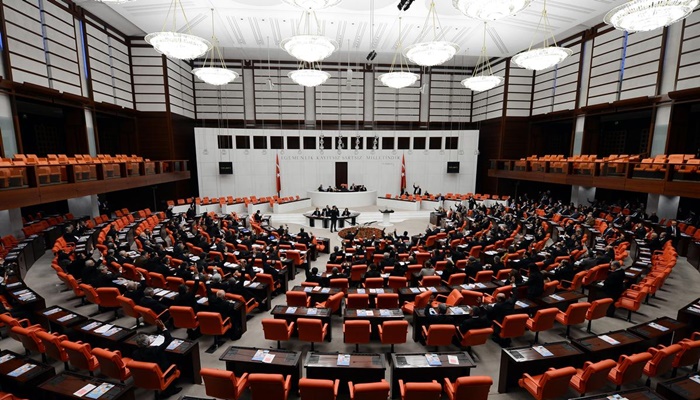The Turkish parliament announced in the plenary session on Tuesday a ruling by Turkey’s Supreme Court of Appeals upholding an 18-year prison sentence for a jailed lawmaker, effectively stripping him of his parliamentary status, in defiance of successive rulings by the country’s Constitutional Court, T24 news website reported.
This follows a judicial crisis in which the Constitutional Court had ruled twice that the rights of Can Atalay, who was elected to parliament in May from the Workers Party of Turkey (TİP) and kept in prison despite gaining parliamentary immunity, were violated. The 13th High Criminal Court, however, sent the case back to the Supreme Court of Appeals twice, defying the top court’s rulings. The top appeals court, which in September upheld an 18-year conviction for Atalay in the Gezi Park trial, also defied the Constitutional Court’s rulings twice, prompting Atalay’s lawyers to file their third application.
There was no vote on whether Atalay should be stripped of his parliamentary status, as the reading of the verdict at the session meant that his status no longer existed.
The verdict was read during a riotous session that included angry chants and attempts to halt proceeding by opposition deputies.
The 47-year-old Atalay successfully ran from prison for a seat in parliament representing the earthquake-ravaged Hatay province in May general election.
The Gezi Park trial defendants were convicted of attempting to overthrow the Turkish government for their alleged role in the protests, which began over an urban development plan in central İstanbul and spread to other cities in Turkey.
The youth-driven demonstrations morphed into a nationwide protest against perceived corruption by the ruling Islamic-rooted Justice and Development Party (AKP) and then-prime minister and current President Recep Tayyip Erdoğan’s growing authoritarianism.
Erdoğan’s government violently dispersed the protests and then began to crack down on its leaders.
Turkey’s Supreme Court of Appeals in September upheld a life sentence for prominent businessman and civil society leader Osman Kavala and 18-year prison sentences for Atalay, journalist and film producer Çiğdem Mater, city planner Tayfun Kahraman and filmmaker Mine Özerden.
Opposition politicians slammed what they saw as a flagrant violation of the constitution after Atalay was stripped of his parliamentary status.
“The Grand National Assembly of Turkey has made itself a partner to the coup attempt carried out by the Supreme Court of Appeals! The palace [Erdoğan’s office] has disregarded the will of the earthquake-stricken people of Hatay and, above all, has de facto suspended the constitution of the Turkish Republic! Today we are starting all over again. We will not give up, we will not give in! Can Atalay will regain his freedom, the people of Hatay will regain their parliament!” TİP posted on X.
“The ousting of TİP Hatay deputy Can Atalay is a continuation of the government’s political coup against the will of the people. The putschists will fail, these coups will not be able to put our people in captivity. Despite this usurpation of the will [of the people], which does not recognize the decision of the Constitutional Court and violates the law, Can Atalay is and will remain the deputy of his people,” the pro-Kurdish Peoples’ Equality and Democracy Party (DEM Party) said on X.
“We are living a dark day under the roof of the Grand National Assembly of Turkey, where the constitution, the law, justice and the will of the people are ignored! Despite the ruling of the Constitutional Court, the stripping of the parliamentary status of Can Atalay is a blow to the will of the people! History will not forgive those who made this decision!” Ali Mahir Başarır, the main opposition Republican People’s Party (CHP) deputy group chairman, posted on X in reaction to the move.
In a sharp criticism of the AKP, Ali Babacan, leader of the Democracy and Progress Party (DEVA), accused the government of undermining judicial independence, highlighting the hypocrisy of the Islamic-rooted party’s reliance on court rulings before they had the upper hand against the secularist establishment. He asserted that the AKP’s actions have compromised Turkey’s status as a constitutional state, casting doubt on the legitimacy of the Constitutional Court.



